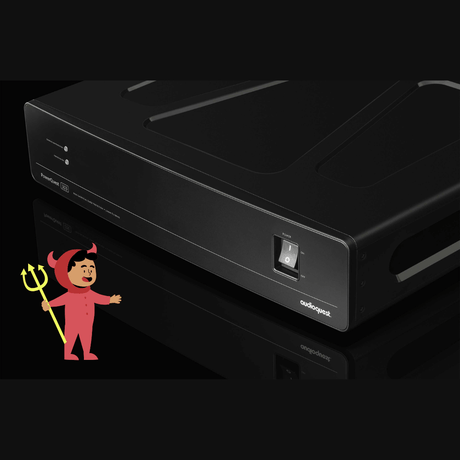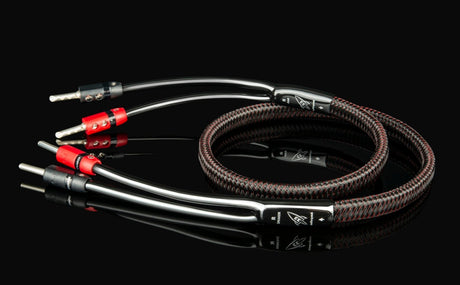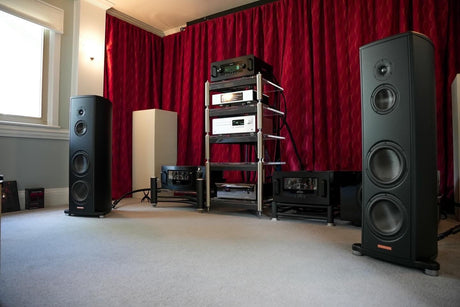Stereophile's Alex Halberstadt, like many hi-fi reviewers and audio enthusiasts, maintains a healthy skepticism for certain aspects of the stereo chain commonly referred to as "tweaks" or "accessories" — things like resonators, racks, stands, and, yes, even our beloved cables and power products.
In the May 2025 installment of his brilliant column, "Brilliant Corners," Alex opens his mind to some of these products, including AudioQuest's own Niagara 3000 power conditioner, Hurricane and Thunder AC power cables, ThunderBird and FireBird interconnects, and ThunderBird ZERO and ThunderBird BASS speaker cables.

He tried our speaker cables with his resident Klipsch La Scala loudspeakers, first using our full-range ZERO cables and later adding the BASS cables in a proper biwired configuration. And, while he enjoyed the sound of music with the full-range ThunderBird ZERO cables, he was surprised by the fuller, more dynamic, more tonally rich presentation imparted when the BASS cables joined the party.
What is this all about? AudioQuest’s BASS cables use our RF/ND-Tech (patented RF-Canceling Ground-Noise-Dissipation) to attract RF energy away from the amplifier’s output, thereby allowing the amplifier to perform optimally. When properly implemented, Bi-Wiring has always been a cost-effective way to get better performance for the same or less money. With RF/ND-Tech, the advantage of Bi-Wiring is made much more dramatic.
And what, exactly, are those advantages? In short, Bi-Wiring keeps the large magnetic fields associated with bass energy out of the treble cable, allowing the delicate upper frequencies to travel a less magnetically disturbed path. AudioQuest founder, Bill Low, an avid swimmer, likens this to taking the waves out of the water as you swim — everything becomes smoother, easier, less demanding.
"I find it difficult to imagine anyone disliking the sound or musical avidity of these speaker cables," Alex decided, "the best I've heard in my home."

He was similarly impressed by our Hurricane and Thunder AC power cables, which made components sound "so obviously richer and more powerful that just about anyone could hear the difference."
But Alex might've been most impressed by our Niagara 3000 power conditioner, calling it "the first power conditioner I haven't hated."
Why would Alex ever hate a power conditioner? Well, as he explains, historically, power conditioners have often come with a compromise, lowering the noise floor at the expense of dynamics and impact — qualities of audio reproduction that add so much life, beauty, and simple fun to the listening experience.
Happily, in the case of Niagara 3000, no such sacrifice need be made. Like its larger siblings, the Niagara 5000 and flagship Niagara 7000, the 3000 incorporates our Transient Power Correction, which, in the case of the N3000, provides power amplifiers a current reservoir of over 55 amps peak (up to 25mS) for AC current transients. When the system requires those quick bursts of energy, the Niagara readily provides it.
How does this translate to music? We'll leave that to Alex.
"The Niagara is the first conditioner I've heard that doesn't rob the music of excitement," he reflects. "Amps I plug into it never sound compressed, rubbery, or otherwise compromised, but they do play considerably quieter."
Learn more about AudioQuest power products here.







